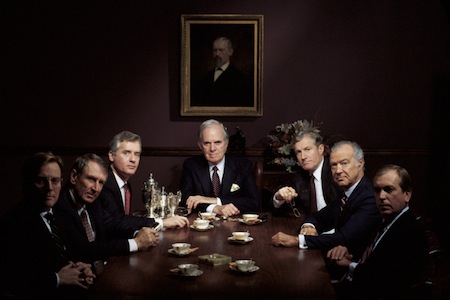This originally appeared at The Guardian. Republished here with permission.
Ready to ‘lean in’ and tackle the old boys’ clubhouse? Be prepared to work harder and have your appearance criticized.
In the next month tens of thousands of women will enroll in graduate school with the goal of being hired in male-dominated professions. They may want to work in finance, engineering, or law (to name just a few of these fields). I wonder if these eager students truly understand the ramifications of such a career.
I do.
After graduation from law school, I joined one of the country’s oldest and most well-regarded law firms. Despite having hundreds of lawyers in offices around the world, it had only one female partner at the time. Seven and half years later I, too, joined their ranks.
Being a woman in this hard-charging world had consequences large and small. All aspects of appearance became an issue. The advent of scaled-down versions of men’s suits sold in the early 1980s provided a safe haven. The style even included high-collared blouses with “ties” that were inch-wide strips of material that clipped around the neck and were often embellished with a single fabric flower. We women imitated the male norm with the goal of making everyone more comfortable.
However, the popularity of women’s pantsuits triggered a strange backlash in the late 1980s by male rule-makers. They resented women abandoning skirts, the traditional symbol of submission and easy sexual access. I was banned from powerful private clubs where masters of the universe cut deals because I was wearing a pantsuit. In a demented attempt to help misguided women foolish enough to commit this fashion faux pax, one establishment offered me a wrap-around gingham skirt that I could don over my slacks and thereby gain entrance to the power brokers’ dining room.
While fashion standards have relaxed somewhat, women’s dress is still an issue. Recently, a Tennessee judge imposed a dress code on women appearing in his courts. No bare arms. Sleeveless dresses were verboten despite the heat of summer. After all, a man would never try that. Even women lawyers who work in conference rooms are cautioned about wearing peep-toe shoes or too much cleavage. One expert goes so far as warning, “Cleavage could sidetrack a legal career.”
Deciding what to wear on the job is an issue women confront every day, but the workplace issue that transcends all else is advancement. How is performance measured? Unfortunately, when a woman’s performance is evaluated, she tends to be judged more harshly than her male peers in traditionally male-dominated fields.
In a recent example from Big Law, a major Wall Street law firm commissioned a consultant to evaluate its associate review process, agreeing the results could be disclosed as long as the firm wasn’t identified. The consultant studied 268 written lawyer evaluations and found that men and women whose work quality was described similarly in narratives received different numerical scores with the men ranking higher. Overall, a significantly higher percentage of men (14%) received evaluations in the top category than women (4.76%). Numbers had greater significance than narratives in partnership decisions with the result that males were three times more likely to become partners than females.
In a shocking denouement to this study, the consultant reported that when she presented her conclusions to firm management, they declined to make any of the changes suggested, changes that included training to make the partners more aware of gender bias. According to the consultant, the firm was getting dinged as one of the worst places for women to work, [but] their philosophy was that there will always be people who are willing to break their backs to work here.
Even when women succeed, the male norm remains the yardstick. At my Big Law firm, I was the first female partner to be awarded a bonus under a new compensation system that embraced financial rewards. When the male member of the bonus committee told me of this recognition, he said: “We consider you an ideal young partner—not just a female partner. You’re an ideal for any young partner.”
Glad for the bonus but furious at the implication, I said, “You aren’t suggesting that there is a different, lesser standard for female partners, are you?” He blanched and waved away my response with muttered denials and more than a touch of umbrage.
This was a classic example of the double-bind dilemma for women. My comment was assertive—the type of comment I think Sheryl Sandberg’s Lean In movement would advocate—but was perceived as too tough. A man would have been applauded for his forthrightness. In a male-dominated field, a woman is damned if she does and damned if she doesn’t. This is the price of working in the old boys’ clubhouse.
Kate McGuinness is a lawyer who spent 17 years at Big Law before becoming the general counsel of a Fortune 500 corporation. After leaving that position, she studied creative writing and is the author of a legal suspense novel Terminal Ambition, which is available on Amazon.com. She is an advocate for women and tweets as @K8McGuinness.
Related Links:

